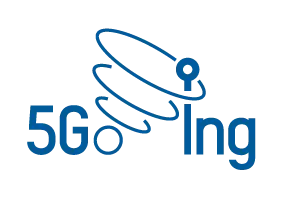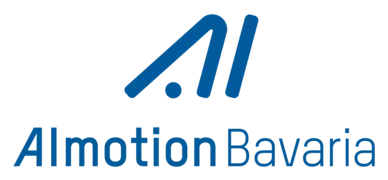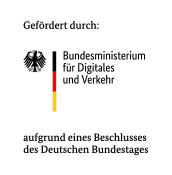
5GoIng
The 5GoIng project is creating an open development and demonstration platform for 5G applications with a focus on connected mobility in Ingolstadt. The starting point is the "Erste Meile (engl: First Mile)" test field for connected and automated driving with the IN²Lab project. 5GoIng expands the test field and uses the new technical possibilities of 5G mobile communications. Research focuses on improving road safety, traffic sustainability and the use of smart city elements.
Research focus "sustainability" in the project 5GoIng
Due to climate change, the reduction of CO2 emissions is becoming increasingly important. Given the high proportion of total CO2 emissions caused by transportation, it is crucial to promote and develop sustainable mobility solutions. The 5GoIng project is researching how this can be achieved using 5G in combination with AI-based traffic analysis and vehicle functions. To this end, a test field will be equipped with state-of-the-art sensor technology and networked with 5G (direct) communication. The planned infrastructure expansion includes traffic cameras and LiDAR units attached to masts. The aim is to record and process the static and dynamic environment of a publicly accessible traffic circle in real time. The traffic situation data collected in this way is used to develop various AI algorithms and Car2X functions with the help of a computing infrastructure (RSUs and Mobile Edge Cloud). Information on the acceleration, speed and position of the various road users is recorded and serves as the basis for investigating various traffic scenarios and interactions between automated vehicles and other road users - including cyclists and pedestrians.
In addition, the development of a traffic simulation plays a central role in creating a virtual copy of the real environment, including the traffic data at the traffic circle and simulating CO2 emissions. The aim is to improve both road safety and sustainability by increasing traffic flow and better integrating sustainable forms of mobility.
The project started in December 2021 and ends on 30.06.2024. The total volume is €4.2 million and is funded by the BMVD Initiative 5G Model Region. The project consortium consists of the Ingolstadt University of Applied Sciences, Fraunhofer IVI with the application center in Ingolstadt, the city of Ingolstadt with the IFG business development agency, Liangdao and ZERO GmbH and is supported by the associated partners brigk, CARIAD, COM-IN, Vodafone Germany and Zukunft Mobility.
THI contact
Prof. Dr. rer. nat. Christian Facchi
Phone: +49 841 9348-3650
Room: P207
E-Mail: Christian.Facchi@thi.de
Prof. Dr.-Ing. Andreas Festag
Phone: +49 841 9348-2255
Room: B102
E-Mail: Andreas.Festag@thi.de












![[Translate to English:] Logo Akkreditierungsrat: Systemakkreditiert](/fileadmin/_processed_/2/8/csm_AR-Siegel_Systemakkreditierung_bc4ea3377d.webp)








![[Translate to English:] Logo IHK Ausbildungsbetrieb 2023](/fileadmin/_processed_/6/0/csm_IHK_Ausbildungsbetrieb_digital_2023_6850f47537.webp)


